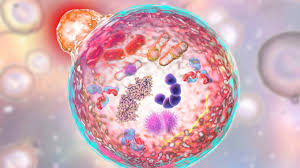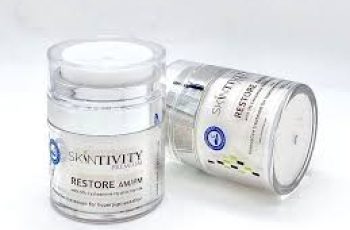Autophagy and Antiaging Skin Care Ingredients
Autophagy slows skin aging by removing old cell components that stimulate or cause aging. The ability of cells to perform autophagy decreases with age causing skin aging.(1,2)
Antiaging skincare products are beginning to try and increase autophagy to rejuvenate skin.
Autophagy Benefits for Skin
Increasing skin autophagy, especially of mitochondria, is a new way to slow skin aging. Many new ingredients are being developed for skin care products to reverse skin aging by increasing autophagy.
Autophagy (3) is the process of cell ‘eating themselves”. (4) In other words, cells break down old organelles and recycle them.
Autophagy serves the purpose of eliminating senescent cells, damaged organelles, proteins, and pathogens, as well as regulating apoptosis (programmed cell death), cell differentiation, immunity, and inflammation.
Skin Care Ingredients
Cosmetic ingredients that increase autophagy in skin are:
Crepidiastrum Denticulatum Extract
Exosomes
Heptasodium hexacarboxymethyl dipeptide-12 ( Aquatide™)
Melatonin
Resveratrol
Saururus Chinensis
The best skincare ingredients to treat skin aging depends upon what your Baumann Skin Type® is.
Our advice is to take the skin care quiz, find out your skin type, and our dermatologists will give you specific skin care routine recommendations.
These may include skin care ingredients that increase autophagy.
Take the Quiz
Skin Care Products
Many new skin care products are being developed to help increase autophagy and decrease the number of senescent cells. Examples of products that contain autophagy increasing ingredients are shown below.
The Science Of Autophagy
The science of aging skin is well understood. Autophagy has been newly discovered as an important part of the skin aging process.
Autophagy is the process by which lysosomes fuse with a cellular organelle and digest it. This recycles the cellular components.
Autophagy regulates extracellular matrix (ECM) metabolism by affecting matrix metalloproteinases (MMPs).
Blocking autophagy leads to an increase in MMPs and an increase in collagen breakdown. TGF-β is a growth factor involved in the regulation of autophagy. (7)
Autophagy has a circadian rhythm (8).
Autophagy in skin aging
Mitochondria and Autophagy
The ability for mitochondria to generate autophagy is particularly important in preventing aging because old mitochondria cause damaging free radicals. Increasing autophagy, especially in mitochondria, is an anti-aging strategy. Increasing autophagy delays aging in flies, worms, and mice.(10)
Substances that induce autophagy such as lithium and trehalose have been shown in nematodes and mice to improve mitochondrial function, reduce senescence, and expand the lifespan.
Sirtuins and Autophagy
Sirtuin-1 (SIRT-1) has been shown to be the reason that caloric restriction improves health and longevity. Activation of SIRT-1 induces autophagy (11).
SIRT-1 is known to be activated by resveratrol (5) and melatonin.(6)
Autophagy and Skin
Autophagy is seen in both proliferating and differentiating keratinocytes. It helps maintain skin stem cells by promoting the removal of oxidized molecules, improves nucleotide excision repair (12) and removes lipofuscin. (13)
Old human dermal fibroblasts have significantly less autophagy than those of young dermal fibroblasts. Loss of autophagy leads to the induction of cellular senescence. Cellular senescence leads to skin aging.
Skin Pigmentation
Decreased autophagy has been seen in melasma due to the lack of degradation of melanosomes resulting in increased skin pigment in the keratinocytes. (16,17)
Autophagy and Diet
Autophagy is induced by nutrient starvation, oxidative stress, infection, and two protein kinases (unc-51 like kinase complex and the phosphatidylinositol 3-kinase complex).(9) We are still learning how to increase autophagy but the most proven way to increase autophagy is with intermittent fasting and caloric restriction. Upregulation of autophagy is thought to contribute to the prolongation of lifespan seen with caloric restriction.
DQH Knowledge drop: In your 20s, your skin cell turnover decreases. (Cell turnover is a key component in keeping your skin youthful.) You know what else slows down? Your collagen production. Starting in your 20s, collagen decreases by about 1 percent per year. Should you want to prevent fine lines and wrinkles, start by eliminating behaviors that contribute to premature aging. “If it’s bad for you, it’s bad for your skin,” says dermatologist Michel Somenek.
“Cigarette smoking reduces blood flow to the skin and causes premature wrinkling and a dull skin texture. Making the repeated pursed motion to inhale can also cause smoker’s lines. Alcohol and recreational drugs are toxins for the skin that damage its cellular structure and DNA,” Somenek tells us. “The faster you eliminate vices while you are young, the better chance your skin and body have to recuperate.” Also, adopting an anti-aging routine in your 20s is key. After all, the best offense is a good defense. We spoke to Somenek and experts Joshua Ross and Audrey Kunin to find out more.
Keep reading for the best anti-aging products for your 20s, according to skincare professionals.
Sunscreen
“We all know that the sun is the number one cause of skin aging and starting the prevention in your 20s is very important,” Ross says. “The majority of your sun damage won’t start to appear until you’re in your 30s, so don’t wait until you see it surface or you’ll be behind the curve. Stay ahead of it with a good-quality zinc-based sunscreen worn daily.”
Farmacy Green Defense Daily Mineral Sunscreen
An invisible sunscreen with SPF 30, plus botanical extracts meant to protect skin with tons of antioxidants. Bonus: It’s clean and fine to use under makeup.
Bareminerals Complexion Rescue™ Tinted Moisturizer Broad Spectrum SPF 30
Although we recommend you use your SPF and moisturizer separately, we also understand moments when you don’t have time or energy for that extra step. For those times, this bareMinerals moisturizer is a great thing to have on hand.
Vitamin C Serum
“A great introduction to anti-aging is to start with a vitamin C serum in your morning skincare routine,” Ross says. “It’s a powerful antioxidant that will neutralize free radicals and brighten the skin.” He adds that it’s a great way to counteract the effects of the sun’s harmful rays, which, as previously mentioned, are among the biggest causes of premature aging.
Drunk Elephant C-Firma™ Vitamin C Day Serum
The Drunk Elephant C-Firma is a lightweight serum that promises to give skin a glow by combining the brightening powers of vitamin C with ferulic acid, l-ascorbic acid, and vitamin E. The included sodium hyaluronate is meant to replace hydration loss, so you shouldn’t have to deal with any irritation.
Sunday Riley C.E.O. Rapid Flash Brightening Serum
This potent serum is jam-packed with vitamin C (15 percent, to be exact), which means it’s a potential superstar at both brightening skin and dousing it in antioxidants.
Peptides
Using peptides on your skin has many benefits, says Somenek. “The skin barrier is what defends the body against pollution, UV rays, bacteria, and toxins. It can be damaged by several everyday factors. Using topical peptides aids in building a stronger barrier,” he says. “Peptides comprise elastic fibers, which are a type of protein. These fibers help to make skin appear taut and firm. Peptides can also help repair damaged skin, relieve inflammation, and even out skin tone. Some peptides can kill acne-causing bacteria that is common in 20-somethings.”
Kunin agrees, saying, “Peptides are an excellent entry point for supporting collagen.” She recommends looking for face and eye treatments that contain these collagen-boosting powerhouses.
Charlotte Tilbury Magic Eye Rescue Cream
This Charlotte Tilbury super-emollient eye cream has a base of coconut oil and shea butter (read: it’s incredibly hydrating). Botanicals plus peptides are meant to help reduce dark circles and boost collagen, respectively.
This creamy moisturizer serves up potent collagen-boosting peptides and pycnogenol, and antioxidant-rich vitamin C. “Instead of sitting on top of the skin, peptides penetrate the outer layer so they go deep. The ‘signals’ they send tell the cells to produce elastin and collagen, which are needed for youthful-looking skin,” explains Somenek.
At-Home Peel Pads
Remember that skin cell turnover fiasco we talked about earlier? One way to help support it is by exfoliating. “Exfoliation is important to help keep skin fresh and luminous,” Kunin says. She recommends using at-home peel pads as an easy and effective way to exfoliate.
“The goal in your 20s is to fight the slowing pace of cell turnover. It is wise to use products that gently exfoliate, yet still remove oil and other impurities. Products that have Alpha Hydroxy Acids (AHA) or Beta Hydroxy Acids (BHA) are a good choice.”
According to Somenek, you should only exfoliate two to three times a week. “People of all ages are guilty of over-exfoliating and that can be too much of a good thing,” he says.
Dermadoctor Kakadu C Intensive Vitamin C Peel Pad
A few swipes of this Derma Doctor powerful peel pad promise to leave your skin glowing and smooth, thanks to the seven (yes, seven) types of chemical exfoliants, including AHA and BHA. It also contains vitamin C via Kakadu plum extract for added brightening and antioxidant protection.
KEY INGREDIENTS Kakadu plum extract is sourced from the Kakadu plum, a fruit grown in northern Australia. It contains vitamin C, which restores the skin’s natural barrier, increases collagen production, and soothes irritation.
Dr. Dennis Gross Skincare Alpha Beta® Universal Daily Peel Pads
These are the gold standard of peel pads, with a cult following and over 900 five-star reviews on Sephora. They’re easy to use and contain a blend of anti-aging exfoliating acids.
Emollient Night Cream
“In your 20s, you need to start upping the hydration in your skincare routine. You may have been cautious of over-moisturizing because of acne in your teens, but as you enter your 20s, your skin transitions and becomes drier,” Ross says. “I recommend an emollient night cream added into your evening skincare regimen.”
“Twenty-somethings need to make sure that they are not using creams that will clog their pores and cause excess oil production,” says Somenek. Opt for non-comedogenic products.
Cerave Skin Renewing Night Cream
One great choice is the CeraVe Skin Renewing Night Cream, which is a non-comedogenic night cream that leaves skin soft and glowy. It combines the moisturizing powers of ceramides and hyaluronic acid.
RoC Retinol Correxion Max Hydration Creme
“The best night cream ingredients contain retinol, benzoyl peroxide, and/or salicylic acid or hyaluronic acid. The goal is to moisturize, yet remove excess oil,” says Somenek. This Roc Retinol Correxion cream fits the bill as it contains both hyaluronic acid and retinol so it promises to moisturize while also being non-comedogenic.



